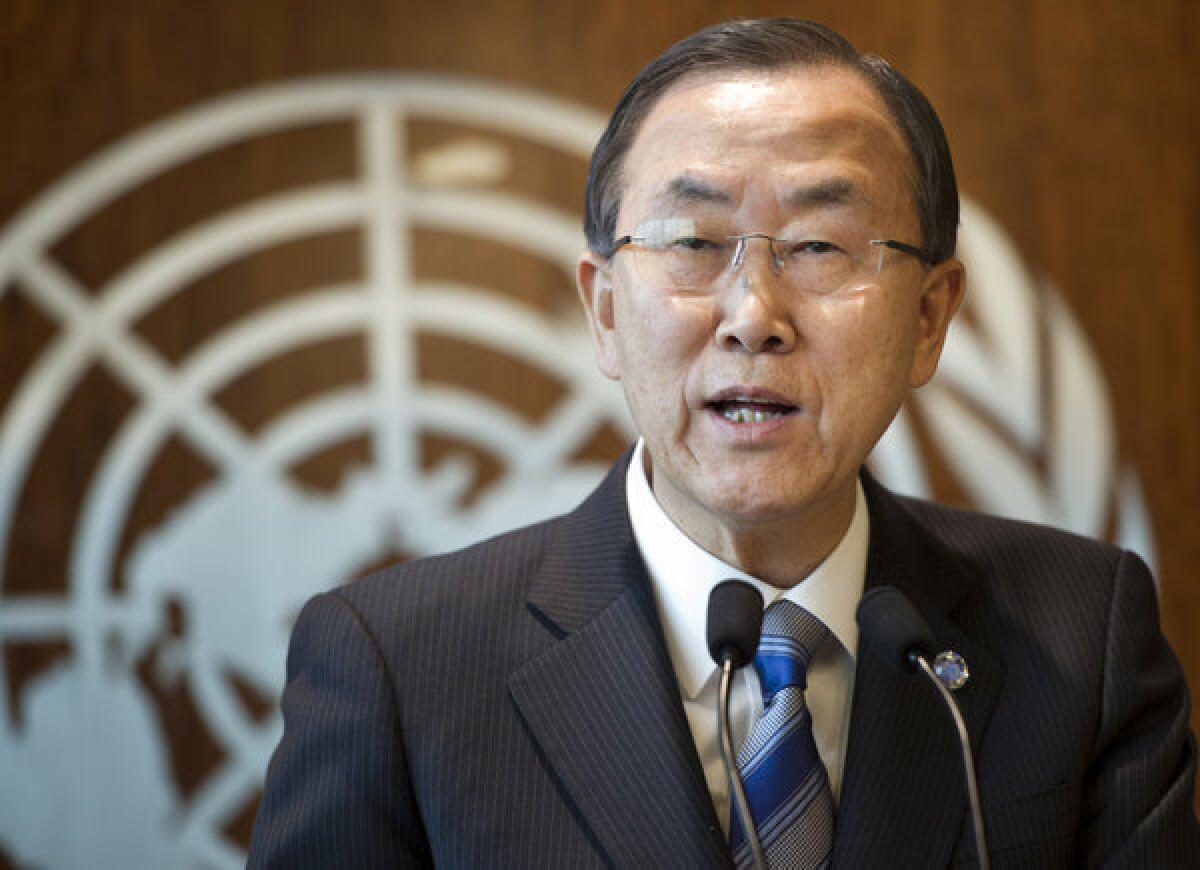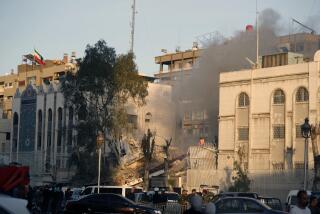Alleged chemical attack in Syria remains a mystery

BEIRUT — The strange case of an alleged chemical attack in Syria has taken some odd turns.
Like so many other mass-casualty attacks in Syria, the alleged poison-gas strike Tuesday in northern Syria has become a case of each side in the conflict blaming the other — and counting on foreign allies to back their version of events, even if the facts seem blurry at best.
Still unanswered amid the barrage of rhetoric are the fundamental questions: Was there a chemical attack? And, if so, who was behind it?
On Tuesday, the government of President Bashar Assad announced that “terrorists” — its usual designation for rebels — had launched a toxic-gas rocket attack that left 25 people dead and 110 wounded in the town of Khan al-Asal, outside the northern city of Aleppo. Damascus demanded a United Nations investigation, which the world body on Thursday promised to carry out.
The alleged attack seemed to have the potential to elevate the two-year Syrian conflict to an urgent new level of international concern. President Obama had said that any government use of chemical weapons — or any sign of such arms being transferred to other powers — would be a “red line” that could trigger a direct U.S. response, widely interpreted as a threat of military intervention.
The opposition promptly rejected any responsibility, blaming the government for the chemical assault.
Why would the Syrian military unleash chemical weapons on a government-held area?
Some pro-rebel spokesmen suggested that the missile carrying the toxic gas had missed its intended target in rebel-held terrain and mistakenly detonated near government troops. There were also allegations that the entire episode may have been crafted to discredit the rebels, who are already dealing with sundry public relations problems — such as Al Qaeda-linked militants in their midst and the kidnapping earlier this month of 21 U.N. peacekeepers near the Golan Heights. (The peacekeepers were eventually released unharmed.)
The reactions of the United States, Russia and other foreign governments to the chemical weapons allegations generally tracked the nations’ allegiances in the Syrian conflict.
U.S. officials immediately expressed deep skepticism that any chemical strike had occurred. “So far we have no evidence to substantiate the reports that chemical weapons were used yesterday,” U.S. Ambassador to Syria Robert Ford told the House Foreign Affairs on Wednesday in Washington.
Despite the ambiguity, Washington -- which has called for Assad’s resignation -- seemed to rule out the notion that U.S.-backed rebels had launched a poison-gas strike. The opposition doesn’t have that kind of capability, U.S. officials argued. If anyone did it, Washington declared, it was probably Assad’s side.
“I will note, without at this point having all the facts before me, that we know the Syrian government has the capacity to carry out chemical attacks,” Obama said Wednesday in Jerusalem. “I am deeply skeptical of any claim that, in fact, it was the opposition that used chemical weapons.”
Any hope in Damascus that the incident would win sympathy from its adversaries in Washington and other foreign capitals was clearly dashed. On the contrary, the news seems to have bolstered the anti-Assad alliance in Washington, London and elsewhere.
Britain, which like the United States is firmly in the anti-Assad camp, even said the reported chemical attack boosted its argument to ease the European arms embargo on shipments of weapons to Syrian rebels. Britain and France are pushing for a relaxation of the European Union ban.
Russia, Assad’s key ally, declared unambiguously that the rebels had launched a chemical attack outside Aleppo.
The bickering continued at the United Nations, where all sides seemed to agree on the need for an investigation. On Wednesday, Britain and France said the U.N. should investigate not one but two alleged chemical strikes — Tuesday’s reported detonation near Aleppo and another attack that, according to the opposition, occurred the same day outside Damascus. That a second alleged chemical attack had even occurred was news to many.
Russia, though, said any U.N. inquiry needed to focus on the assault near Aleppo. Moscow accused the West of bringing up the second reported incident in a bid to stall or torpedo the international inquiry.
In announcing the U.N. probe Thursday, Secretary-General Ban Ki-moon suggested it could be broader than the Tuesday incident, the Associated Press reported. Ban said he was aware of other, similar allegations and hoped the probe would help secure Syria’s chemical weapons stockpile.
“My announcement should serve as an unequivocal reminder that the use of chemical weapons is a crime against humanity,” the secretary-general said. “The international community needs full assurance that chemical weapons stockpiles are verifiably safeguarded.”
ALSO:
Jailed Kurdish leader calls for truce with Turkey
Hackers who hit South Korea used an old tactic
India passes rape law that sets age of consent at 18
Special correspondent Nabih Bulos in Amman, Jordan, contributed to this report.
More to Read
Start your day right
Sign up for Essential California for news, features and recommendations from the L.A. Times and beyond in your inbox six days a week.
You may occasionally receive promotional content from the Los Angeles Times.






